Oui! Toi, Tu es. Tout a du sens.
1.- L’annonce de ta visite. Toute la Création parle de Toi. Si nos oreilles sont attentives, le mutisme du créé n’existe pas ; si nos yeux scrutent les horizons, il n’y a pas vide de Toi. La nuit, le jour, l’air bleu ou le vent, l’herbe des champs et la vitesse des rivières, murmurent et chuchotent et, en leur rumeur, nous pouvons Te reconnaître. Tout te nomme comme Toi, au commencement, Tu l’as nommé et cela a existé. Oui ! Le monde révèle le mystère de ta présence Chaque être humain est l’image de ce Dieu invisible que nous pressentons et auquel nous parlons ; il fait référence à Lui seulement avec son être dans ce monde parce qu’élu comme lieu privilégié de la visitation de Dieu. Dieu s’est fait une maison dans ce cosmos et dans le même être humain. Nous pouvons suivre à la trace cette empreinte pour te trouver, mais cela ne nous suffit pas parce que nous désirons toujours le visage, l’étreinte la plus profonde, la présence vive. Tu es encore loin, et c’est pour cela que ta venue nous est urgente, approche-toi et rends-nous visite. Si notre cri n’était pas entendu avec désespoir, nous n’aurions qu’à conformer notre vie à ce monde étroit et insuffisant, parce que nous vivons entre le sentiment d’une réalité au-delà de ce que nous voyons et la tentation de conformer la vie à ce que nous voyons, entre regarder au loin ou réduire le regard. Nous ne pouvons que te presser ou nous taire pour toujours. Voici que tout parle de Toi nous prévenant de ta visite. Les cieux s’ouvriront et distilleront la rosée, la justice fleurira, et le Seigneur viendra (Cfr. Is 45, 8). Tout annonce ta venue. « Oui, ma venue est proche! » (Ap 22, 7). Et quand Jésus, le Seigneur, viendra, la distance se raccourcira entre le visible et l’invisible, l’immanent et le transcendent, le contingent et l’éternel, le Dieu qui habite le ciel et l’homme sur la terre. 2.- Toi, tu es ici. La Création t’attend parce que c’est seulement quand Tu y es qu’elle parvient à son sens le plus entier. Tu es là, et alors, tout est là où il doit être, et tout devant Toi se fait présent. Quand Tu appelles les êtres, ils existent (Cfr. Baruch 3, 35); les étoiles vont à ta recherche, leur orbite a en Toi leur repos ; les arbres battent des mains, les collines poussent des cris de joie, (Is 55, 12), les anges chantent avec joie ta gloire (Lc 2, 14), et les hommes de tous les confins de la terre, se réunissent et se prosternent auprès de l’Enfant nouveau-né. (Mt 2,11). Toute la Création et toute l’humanité ouvre son sein pour t’accueillir. Les animaux te réchauffent et t’abritent, les hommes apportent devant Toi leur travail et leur peines, leurs fromage blanc et leur miel ; la mère recouvre et donne le sein à un Dieu. Le père soutient le mystère de son humble accueil. Tout est devant Toi. Tu es arrivé et tout t’attendait. La visite de Dieu en Jésus a fait possible que l’invisible soit vu, l’intouchable soit touché, de savourer l’incréé. Et si à ton arrivée les hommes ne chantaient pas, les anges ont dû chanter. Parce que « il y a eu des cantiques, oui !, dans les temps obscurs » Si Jésus nait au milieu de nous, à nouveau le chaos se transforme en cosmos et la vie, même celle du plus démuni et pauvre parmi toutes les créatures, a une cause et trouve son destin parce que le Fils est venu à cette chair et l’a épousé en alliance éternelle, faisant de Dieu et de l’homme une unique pièce en Lui. Le sommet du salut est ce « ostrakón », cette tessère divine, Dieu-Homme s’unissent, coïncident et s’allient. En Jésus-Christ, Dieu et l`être humain se sont réconciliés c’est précisément cette vérité qui rend possible le fait de tout comprendre, tout assumer, même cette vie qui dans sa beauté, laisse entrevoir la Lumière indicible, et qui dans sa contingence, est très insuffisante. Dieu n’est pas un ennemi pour l’homme et l’homme n’est pas un ennemi pour Dieu, ils sont amis. Notre attente a été comblée. Mais cela ne suffit pas non plus, c’est pourquoi chaque année nous nous souvenons de ce qui s’est passé, image d’une venue définitive, dans laquelle l’unité sera soudée pour toujours. Tu viens et Tu viendras. Tu es et Tu seras là. Là où ta venue nous amène. 3.- Recevez-le. « Nous attendons un Sauveur. Le Seigneur Jésus-Christ » (Tit 2, 13). La réponse de l’homme devant ce lumineux mystère ne peut Être autre que celle d’accueillir le Seigneur qui arrive, le recevoir ici, dans notre vie quotidienne et dans notre monde personnel et social, communautaire et ecclésial. Recevez le Dieu qui vient, accueillez-Le et laissez-Le entrer pour qu’il opère le miracle de la communion réconciliatrice entre Dieu et l’homme, et entre les hommes entre eux. Nous avons besoin d’apprendre à recevoir, à nous ouvrir et à laisser les fermetures provoquées par la peur, l’égoïsme et l’angoisse. Ouvrons, donc, les portes de l’accueil (cfr. Is 26, 1-6), recevons le Seigneur qui arrive et nous demande d’être accueilli et reçu. Joyeuse Pâque de la Nativité du Seigneur! Monastère de la Conversion Sotillo de la Adrada, Ávila « Par Toi toutes les choses sont parvenues à être. Le monde n’est plus une nature installée sur son propre mystère ; il est ton œuvre. Tu l’as conçue et Tu l’as fait exister. Par Toi elle a réalité et force, essence et sens, et Tu as rendu témoignage d’elle en disant “qu’elle est bonne”, “très bonne”. Je crois que tout a été créé par Toi, ô Dieu. Apprends-moi à comprendre cette vérité. C’est la vérité de mon existence. Si on l’oublie, je me plonge dans le déraisonnable et la sottise. Mon cœur est d’accord avec elle. Je ne veux pas vivre par droit propre, mais affranchi par Toi. Je n’ai rien par moi-même ; tout est ton don et seulement sera mien si je le reçois de Toi. Constamment je me reçois de ta main. C’est ainsi et ainsi cela doit être. Celle-ci est ma joie et ma vérité. Constamment tes yeux me regardent et je vis de ton regard, mon Créateur et mon Sauveur. Apprends-moi à comprendre, dans le silence de ta présence, le mystère de mon existence. Et de ce que j’existe par Toi, devant Toi et pour Toi. Amen» R. Guardini
¡Sí! Tú estás. Todo tiene sentido.
1.- El aviso de tu visita. Toda la Creación habla de Ti. Si nuestros oídos están atentos no existe la mudez de lo creado; si nuestros ojos escudriñan los horizontes no hay vacío de Ti. La noche, el día, el aire azul o el viento, la yerba de los campos y el rápido de los ríos, murmuran y susurran y en su rumor podemos reconocerte. Todo va nombrándote como Tú, en el principio, lo nombraste y existió. ¡Sí! El mundo revela el misterio de tu presencia. Cada ser humano es la imagen de ese Dios invisible que barruntamos y al que hablamos, que hace referencia a Él con su solo estar en este mundo porque ha sido elegido como el lugar privilegiado de la visitación de Dios. Dios se ha hecho una casa en este cosmos y en el mismo ser humano. Podemos rastrear esta huella para encontrarte pero no nos basta porque anhelamos siempre el rostro, el abrazo más hondo, la presencia viva. Todavía estás lejos y por eso urgimos tu venida, que te acerques y nos visites. Si nuestro grito no fuera escuchado desesperadamente, habríamos de conformar la vida a este mundo estrecho e insuficiente, porque vivimos entre el barrunto de una realidad más allá de la que vemos y la tentación de conformar la vida en lo que vemos, entre mirar lejos o recortar la mirada. No podemos hacer sino urgirte o enmudecer para siempre. He aquí que todo habla de Ti avisando de tu visita. Se abrirán los cielos y destilarán el rocío, florecerá la justicia, vendrá el Señor (cf. Is 45, 8). Todo avisa de tu venida. “Sí, yo vengo pronto” (Ap 22, 7). Y, cuando venga Jesús, el Señor, se acortará la distancia entre lo visible y lo invisible, lo inmanente y lo trascendente, lo contingente y lo eterno, el Dios que habita en el cielo y el hombre, en la tierra. 2.- Tú estás aquí. La Creación te espera porque solo cuando Tú estás cobra su sentido más pleno. Tú estás aquí y, entonces, todo está donde tiene que estar, y todo ante Ti se hace presente. Cuando Tú llamas a los seres existen (cf. Bar 3, 35); las estrellas van en tu búsqueda, su órbita tiene en Ti su descanso; los árboles aplauden, las colinas gritan de alegría (Is 55, 12), los ángeles cantan con júbilo tu gloria (Lc 2, 14) y los hombres, desde todos los confines de la tierra, se reúnen y se postran ante el Niño recién nacido (Mt 2,11). Toda la Creación y toda la humanidad abre su seno para acogerte. Los animales te dan el calor y el cobijo, los hombres traen ante Ti su trabajo y sus penas, su requesón y su miel; la madre arropa y da de mamar a un Dios. El padre sostiene el misterio con su humilde acogida. Todo está ante Ti. Tú has llegado y todo te esperaba. La visita de Dios en Jesús ha hecho posible que lo invisible sea visto, lo intocable sea tocado, saborear lo increado. Y, si a tu llegada los hombres no cantaran, cantarán los ángeles. Porque “habrá cánticos, ¡sí! En los tiempos oscuros”. Si Jesús nace en medio de nosotros de nuevo el caos se transforma en cosmos y la vida, incluso la del más indefenso y pobre de todas las criaturas, tiene un porqué y halla su destino porque el Hijo ha venido a esta carne y se ha desposado con ella en alianza eterna haciendo de Dios y el hombre una única pieza en Él. La cima de la salvación es este “ostrakón”, esta tésera divina, en el Dios Hombre se unen, encajan y se alían. En Jesucristo, Dios y el ser humano han quedado reconciliados y es precisamente esta verdad la que hace posible comprender todo, asumir todo, incluso esta vida que, en su belleza, deja atisbar la Luz indecible y, en su contingencia, es muy insatisfactoria. Dios no es un enemigo para el hombre y el hombre no es un enemigo para Dios, están amigados. Nuestra expectativa ha sido colmada. Pero tampoco basta, por eso cada año recordamos lo que aconteció, imagen de una venida definitiva, en la que la unidad quedará soldada a Fuego para siempre. Vienes y vendrás. Estás y estarás allí. Donde Tú con tu venida nos llevas. 3.- Recibidle. “Aguardamos un Salvador. El Señor Jesucristo” (Tit 2, 13). La respuesta del hombre ante este luminoso misterio no puede ser otra sino la de acoger al Señor que llega, recibirle aquí, en nuestra vida cotidiana y en nuestro mundo personal y social, comunitario y eclesial. Al Dios que viene, recibidle; al Señor que se acerca, acogedle. Y dejadle entrar para que se obre el milagro de la comunión reconciliadora entre Dios y el hombre, de los hombres entre sí. Necesitamos aprender a recibir, a abrirnos y dejar las cerrazones provocadas por el miedo, el egoísmo o la angustia. Abramos, pues, las puertas de la acogida (cf. Is 26, 1-6), recibamos al Señor que llega y nos pide ser acogido y recibido. ¡Feliz Pascua de la Natividad del Señor! Monasterio de la Conversión Sotillo de la Adrada, Ávila “Por Ti llegaron a ser también todas las cosas. El mundo ya no es una naturaleza asentada en su misterio propio; es obra Tuya. Tú la ideaste e hiciste que existiera. Por Ti tiene realidad y fuerza, esencia y sentido, y Tú diste de ella el testimonio de que es “buena” y “muy buena”. Creo que todo fue creado por Ti, oh Dios. Enséñame a comprender esta verdad. Es la verdad de mi existencia. Si se olvida, me hundo en la sinrazón y la insensatez. Mi corazón está de acuerdo con ella. No quiero vivir por derecho propio, sino emancipado por Ti. Nada tengo por mí mismo; todo es don tuyo y solo será mío si lo recibo de Ti. Constantemente estoy recibiéndome de tu mano. Así es y así ha de ser. Esta es mi verdad y mi alegría. Constantemente me miran tus ojos y yo vivo de tu mirada, Creador y Salvador mío. Enséñame a comprender, en el silencio de tu presencia, el misterio de que yo exista. Y de que exista por Ti, ante Ti y para Ti. Amén”. R. Guardini Pascha Niewinnego, który zbawiaList braterski Chrystus bowiem również raz umarł za grzechy, sprawiedliwy za niesprawiedliwych, aby was do Boga przyprowadzić (1P 3, 18). 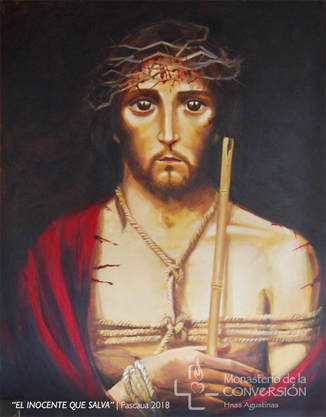 Kochani bracia i siostry, Paschą rozpoczyna się sąd nad światem (J 12, 31), nad życiem, nad człowiekiem, nad Bogiem i trzeba zacząć od oczywistego i pewnego stwierdzenia, że łatwo jest nam utożsamiać się z ofiarami, ponieważ jesteśmy rzeczywiście blisko nich, ale nikt z nas nie przyznaje się do bycia oprawcą, którym także jesteśmy, którego nosimy w sobie, który przyczaja się, ukryty w całym szeregu powszednich działań, które go uwidaczniają, pozostawiając bez wyroku. Nie jesteśmy niewinni! Wszyscy doświadczyliśmy poczucia winy, mamy pewność, że nasze życie utraciło niewinność na którymś z pierwszych zakrętów. Chcemy przekraczać, nawet ten najbardziej niewinny z nas, dąży do odkrycia tajemnic i jest nimi wabiony do tego stopnia, że jest zdolny zaryzykować, wkraczając w najciemniejsze sfery; zagłębia się w nie bądź przez zwykłą ciekawość, bądź przez chęć doświadczenia na własnej skórze, bądź przez pragnienie odkrycia tego, co woła w nas - jako fałszywa obietnica wolności i szczęścia, którego tak pragniemy - że musi zostać odkryte. Nie jesteśmy niewinni, ale czy czujemy się winni? W świecie, w którym nie ma winnych, uznanie własnej winy zakrawa na rzecz niemożliwą, na niekorzyść, budzi niepokój. Jeśli nie popełniliśmy obrzydliwych przestępstw ani okrutnych czynów, to możemy być jedynie wdzięczni, że nasze życie nie było w rękach tych, którzy mogli nas do nich doprowadzić. Nie wiemy co by się z nami stało, gdybyśmy znaleźli się w sytuacji, w której żyło wielu katów. Jakkolwiek, dzielimy los człowieka, z tym rodzajem się stykamy, z nim się utożsamiamy. Stworzenie nadziei, którym jesteśmy - kiedy uznaje swoją winę albo kiedy zostaje oskarżone - prosi o łaskawość i obronę, której nie może udzielić ani sobie samemu, ani innym. Bóg Starego Testamentu bierze na siebie grzech ludu (Wj 34, 6-7). To Bóg bogaty w miłosierdzie (Ef 2, 4-9), który przebacza winy i podtrzymuje obietnicę, ponieważ jest niewinny, a tylko niewinny ma moc przebaczenia. Ta Boża niewinność zostaje ujawniona w Synu, w Sprawiedliwym, który bierze na siebie ciężar sprawcy (J 19, 17), uznając to kim nie jest, stając się winowajcą, skazanym na śmierć, aby wydać bitwę, która należała do nas. Winny! On wszedł do rzeki grzeszników i od momentu Chrztu podzielił los człowieka, dopełniwszy go wyrokiem śmierci, w Chrzcie krwi, kiedy zastępując nas, postawił się na naszym miejscu, zadziałał na naszą korzyść i przejął się naszymi grzechami, prosząc Ojca o przebaczenie (Łk 23, 34). W Nim zostaliśmy pojednani. Albowiem w Chrystusie Bóg jednał z sobą świat, nie poczytując ludziom ich grzechów, nam zaś przekazując słowo jednania (2 Kor 5, 19). To jest bezmiar (brak miary) miłości Boga, objawiony w Chrystusie Jezusie, który ma nieograniczoną moc, aby zwyciężać zło, winę, nienawiść, lekceważenie. On przyjął naszą egzystencję winowajców, grzeszników, i staje na naszym miejscu, nie tylko po to, aby nas zastąpić, ale również po to, aby wystąpić w naszym imieniu przed Ojcem i urzeczywistnić ostateczną i definitywną odbudowę, która zakłada odnowę całkowitą (Ap 21, 5). Do którego winnego jest skierowana ta miłość totalna i odnawiająca, ta łaska pojednania? Nie do jakiegokolwiek winnego, ale do skruszonego winowajcy. Tu jest nasz niekwestionowany udział, to jest nasze zadanie wobec daru, to najcenniejsza łaska, odpowiedź najbardziej wolna, najbardziej drogocenna. Wyrazić skruchę za wszelkie zło wobec ogromu otrzymanego dobra, aby usłyszeć od Niewinnego ostateczny wyrok nad nami: Niewinny (Łk 23, 43). Zostaliśmy wyzwoleni od grzechu, śmierci i zła mocą Baranka i ta paradoksalna rzeczywistość chrześcijaństwa to najjaśniejsza, ale i najbardziej zdumiewająca prawda, która ukazuje wszech-słabość, brak przemocy, niemoc jako prawdziwą potęgę, która miażdży siły zła. Pasja Chrystusa otwiera nową ścieżkę w relacji między ludźmi i Bogiem oraz pomiędzy nami, którzy jesteśmy dla siebie braćmi i dziećmi: niewinny poszukuje winowajcy, aby go ocalić; niewinny nie stosuje przemocy, aby uchronić winnego od błędu, ale prowokuje go miłością ponad miarę, która powstrzymuje szaleńczą lawinę zła. Aż winowajca uzna, że prawdziwie, Ten był Synem Bożym (Mt 27, 54). Zostaliśmy obmyci krwią Niewinnego (1 J 1, 7) i od tamtej pory męczeństwo jest najbardziej radykalnym sposobem naśladowania Jezusa, a zatem, jest drogą Kościoła. Chociaż naśladowanie Go prowadzi człowieka po bolesnych śladach, to jednak zmierzają one do paschalnego poranka, do udziału ze Zmartwychwstałym. Panie Jezu, stań wobec nas z całą niewinnością Twojego życia i odsłoń przed nami prawdę o nas samych, o naszej bratobójczej zazdrości, o naszym znieczuleniu i obojętności, o naszych grzechach zaniedbania, kiedy odwracamy oczy, żeby nie widzieć. Oczyść, Panie miłosierdzia, nasze serce i udziel mu światła łaski pojednania, które jest jego wypełnieniem. Wyrwij z nas nienawiść i podłość, brudne zagrywki zła, które drąży aż do wytworzenia w nas śmiertelnie niebezpiecznej pustki. Wyzwól nas, Panie Niewinności, od naszych zranień, które ranią innych, od zabójczej agresji, od naszej pokrętnej złośliwości, której nie chcemy wykorzenić i którą chowamy, tym samym utrwalając ją aż do śmierci. Panie, Błogosławiona Niewinności, udziel nam łaski, abyśmy potrafili uznać nasze zło i poświęcić się dobru, abyśmy potrafili uznać własną i cudzą winę, abyśmy czuli się odpowiedzialni za zło, którego doświadcza nasz brat, a także za to, które popełnia. Nie pozwól, abyśmy odchodzili umywając ręce, otrząsając je, jak gdybyśmy nie brali udziału w tej zaciętej walce. Zanurz nas, Panie, w Paschę, abyśmy mogli narodzić się na nowo. Obroń nas, Panie, niewinna Ofiaro za nasze grzechy. Święty Panie Jezu Chryste chcemy przeżyć tę Paschę wykąpani w krwi niewinnej, obmyci twoją niewinną krwią. Przejdź, Panie wszelkiego dobra, przez nasze życie, wyrywając z niego najgłębiej zakorzenione zło. Idziemy za Tobą, Niewinny, który zmierzasz ku śmierci na Krzyżu. Idziemy z Tobą do Jerozolimy. Zobowiązujemy się wobec Ciebie, stajemy po Twojej stronie na tym Sądzie nad światem. Błogosławionej Paschy Niewinnego, który zbawia! Comunidad de la Conversión (Wspólnota Nawrócenia) Haz clic aquí para editar. A megváltó Ártatnanság Húsvétja "Mert Krisztus is meghalt egyszer a bünösökért, az Igaz a bünösökért, hogy minket Istenhez vezessen" (1Pét 3, 18.) 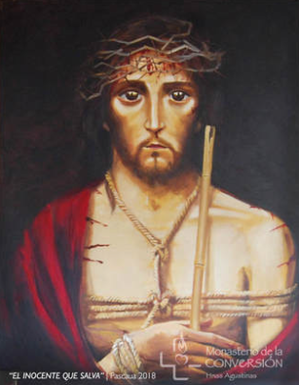 BŰNTUDAT. Kedves testvérek. A Húsvéttal veszi kezdetét az ítélet a világ (Jn 12, 31), az élet, az ember, és Isten felett. Egy világos és egyértelmü megállapításból kell kiindulnunk: abból ugyanis, hogy könnyü azonosulnunk az áldozatokkal, mert valóban az ö oldalukon állunk, azonban egyikünk sem vallja magát pribéknek, pedig az is vagyunk, magunkban hordozzuk, palástolva meglapul ezernyi mindennapi cselekedetünkben, melyek elárulják, de nem ítélik el. Nem vagyunk ártatlanok! Bebizonyosodott bünösségünk, a bizonyosság abban, hogy az életünk már az elsö útkanyarulatban elvesztette ártatlanságát. Törvénysértök vagyunk, és még a közöttünk a legártatlanabb is arra törekszik, hogy felfedje a rejtélyeket, és így elcsábul egészen addig a pontig, hogy megkockáztatja a belépést a legsötétebb világokba, behatol oda pusztán kíváncsiságból, vagy hogy elsö kézböl ismerje meg, vagy hogy felfedezze, azt, ami a szabadság és a boldogság kétes ígéretét harsogja, amelyre annyira vágyunk. Nem vagyunk ártatlanok, de vajon bűnösnek érezzük-e magunkat? Egy olyan világban, ahol nincs vétek, de nincs bocsánat sem, ez majdhogynem lehetetlen bünösnek vallani magunkat elutasítandó, riasztó. Azt, hogy nem jutunk el odáig, hogy mélyen elítélendö vétkeket, kegyetlen cselekedeteket kövessünk el, annak kell köszönnünk, hogy az életünk nem volt olyan kéz által vezettetve, amellyel akár elkövethettük volna. Nem tudhatjuk, mi lett volna belölünk, ha ugyanazon körülmények között éltünk volna, mint a megannyi pribék. VÉDELEMRE, MEGVÁLTÁSRA SZORULVA. Akárhogy is legyen, minden emberi lény ugyanabban a sorsban osztozik, ebben a fajban találtatunk, és ezzel azonosulunk. A reménység teremtményei vagyunk, aki amikor felvállalja a vétkét, vagy amikor vádolják kegyelmet, védelmet kér, s ezt sem önmagának, sem másnak nem tudja megadni. AZ ÁRTATLAN A BŰNÖSÖKÉRT. Az Ószövetség Istene hordozta a nép vétkét (Kiv 34, 6-7). Az irgalmasságban gazdag Isten (Ef 2, 4-9.) megbocsátja a bünöket, és megtartja ígéretét, mert ártatlan, és csak az ártatlannak van hatalma megbocsátani. Ez az isteni ártatlanság a Fiúban nyilvánul meg, Ő ay, az Ártatlan, aki magára veszi a bünös terhét (Jn 19, 17.), felvállalja azt, ami nem is az övé, halálra ítéltté teszi magát, hogy megvívja a mi csatánkat. Bünös! Ö belépett a bünösök folyójába, és már a megkeresztelkedésétöl fogva közösséget vállal az embersorssal és halálra ítélve beteljesíti azt, a vérkeresztségben bennünket képvisel, a mi helyünkbe lép, a javunkra cselekedett és az Atyánál való bocsánatkérésben magára veszi vétkeinket (Lk 23, 34) Öbenne lettünk kibékítve. "Mert Isten volt az, aki Krisztusban megbékítette magával a világot úgy, hogy nem számította be büneinket, és ránk bízta a békéltetés igéjét." (2Kor 5, 19.). Ez az Isten szeretetének többlete - amely korlátlan erövel fog bírni a pusztítás, a vétek, a gyülölet, a távolság legyözésére - Krisztusban nyilvánult meg. Ö magára veszi a mi bünös létünket, a vétkesekét, és a mi helyünkbe lép, nemcsak helyettesít, hanem képvisel is bennünket az Atya elött, egészen addig, amig el nem érkezik a végsö és végleges helyreállítás, amely magával hozza a teljes megújulást (Jel 21, 5.). És ez a teljes és megújító szeretet, a megbékélés kegyelme melyik bünösnek szól? Nem egy akármilyen bünösnek, hanem a bünbánó bünösnek. Ez a mi visszavonhatatlan részünk, ez a feladat az ajándékkal, ez a legdrágább kegyelem, a legszabadabb válasz, ez a legértékesebb; hogy végül megbánjunk, annyi rosszat annyi kapott Jóért, egészen addig, amíg meg nem halljuk az Ártatlan végsö ítéletét felettünk: ártatlan! (Lk 23, 43.) A Bárány erejéböl megszabadultunk a büntöl, a haláltól és a rossztól, és ez a valóság a keresztény út ellentmondásossága, a legfénylöbb igazság, és egyúttal a legmeghökkentőbb, mert úgy mutatja a "mindenható gyöngeséget", az eröszakmentességet, az erötlenséget, mint valódi erö, amely szétroppantja a rossz hatalmát. Krisztus szenvedése új ösvényt nyit meg az emberek és Isten, és köztünk, mint gyermekek és testvérek közötti kapcsolatban: az ártatlan keresi a bünöst, hogy megmentse, az ártatlan nem alkalmaz eröszakot, hogy megmentse hibájától a bünöst, hanem a szeretet többlete az, ami megbénítja a rossz szédítö útját. Egészen addig a pontig, amikor a bünös felismeri, hogy "ez valóban Isten Fia volt" (Mt 27, 54.). Az ártatlanság vérében tisztultunk meg (1Jn 1, 7.), és ettöl kezdve a mártírság Jézus követésének legradikálisabb módja, éppen ezért ez az Egyház útja. Az Ő követése az embert fájó nyomdokaiba lépve a Húsvét hajnalához vezeti, a Feltámadott jelenlétébe. Urunk Jézus, állj elénk életed egész ártatlanságával, és fedd fel előttünk káini írigységeink, megtürt távolságaink, mulasztásainkból fakadó büneink valóságát, amikor elfordítjuk fejünket, hogy ne lássunk. Tisztítsd meg, irgalmasság Ura, a szívünket és add meg a megbékélés kegyelmének világosságát, "mert ez a küldetése". Szakítsd ki belölünk a gyülöletet, a gonoszságot, a rossz ádáz cselvetéseit, mely addig vájkál, amíg veszélyes és halálos űr támad bennünk. Szabadíts meg bennünket, ártatlanság Ura, sebeinktöl, melyek másokat is megsebesítenek, gyilkos eröszakosságunktól, a tekervényes rosszindulattól, melyet nem írtottunk ki gyökerestül, hanem elrejtve egészen a halálunkig fenntartunk. Uram, áldott Ártatlanság, add meg nekünk a kegyelmet, hogy fel tudjuk vállalni a rosszat, hogy átöleljük a jót, hogy viseljük a saját és mások vétkének terhét, hogy felelösnek érezzük magunkat a rosszért, amelytől testvérünk szenved, és azért is, amelyet elkövet. Ne hagyd, hogy kezünket mosva továbblépjünk, hogy lerázzuk magunkról, mintha nem lenne részünk ebben az elfajult harcban. Keresztelj meg bennünket, Urunk, a Húsvétban, hogy újjászülethessünk. Oltalmazz meg Urunk, ártatlan Áldozat a büneinktöl. Szent és Úr Jézus, ezt a Húsvétot az ártatlan vérben megfürödve szeretnénk élni, megmosakodva a te ártatlan véredben. Vonulj át az életünkön, minden jó Ura, szakítsd ki belöle a gonoszság kiírthatatlan gyökerét is. Követünk téged, Ártatlanság, aki a kereszthalál felé lépkedsz. Veled megyünk Jeruzsálembe. Elkötelezzük magunkat Veled, melletted állunk ebben az ítéletben a világ felett. Védelmezz bennünket, Urunk, ártatlan Áldozat, bűneinkért. Como un jefe. A megváltó Ártatnanság Húsvétja
"Mert Krisztus is meghalt egyszer a bünösökért, az Igaz a bünösökért, hogy minket Istenhez vezessen" (1Pét 3, 18.) PASCUA 2012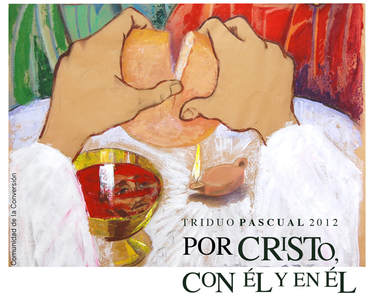 CON CRISTO, POR ÉL Y EN ÉL Querido Hermano y Hermana, la vida es Don de Dios. Sobre nosotros dijo Dios “Ven” (Gn 1, 26) y fuimos traídos a la vida, ofreciéndosenos esta como don precioso y como tarea. Esa Palabra Creadora fue a la vez Palabra de Comunión porque expresaba el deseo de Dios sobre su criatura: que no solo existiera sino que conociera su Amor y viviera en Comunión con Él. Es también la Palabra del Hombre que requiere a Dios y clama su presencia para que salve su precaria y angosta necesidad y colme a su vez el anhelo constante e infinito de Comunión que ha dejado en él. Jesucristo se acercó al hombre dirigiéndole la misma Palabra. “Ven y sígueme” (Mc 1, 17). Él nos ha llamado a ser con Él, a estar con él, a vivir cerca, en su compañía (Jn 2, 35- 39). Porque solo esa cercanía podía despertar al hombre del letargo, romper sus cegueras, curar sus heridas, su hambre y su sed, y mostrarle el Camino de vuelta hacia el Padre. Solo desde ella podíamos conocer el Amor del Padre y la vida misma de Dios. Estar con Él, día a día, nos ha salvado revelándonos la grandeza de la vida humana cuando Dios está con nosotros. Salva a los de dentro y salva a los de fuera, a todos los que rozan una experiencia de Comunión con Él y con los hermanos. En un mundo como el nuestro la Comunidad- Comunión se hace signo y sacramento de salvación por el hecho de ser lo que es. La soledad en el hombre contradice su misma aspiración y deseo; la Comunidad y la Comunión afirman aquello para lo que está hecho su corazón. Somos seres llamados y llamados a estar con Él y llamados a ser Comunión. ¿De dónde brota la fuente de nuestra Comunión? El Sacrum Convivium es la fuente. Jesús sube a Jerusalén con sus discípulos para alcanzar la cima de la verdad sobre el hombre y su relación con Dios. La Pascua fue toda ella un golpe de luz sobre este mortal anhelo de unidad que estaba llamado a cuajarse en algo definitivo y sin fisura, que recogiera el tiempo en una sola Hora, en la que el pasado, presente y futuro estuvieran sellados por una ofrenda que nunca caducase. En la mesa del primer Jueves Santo de la historia se concentró el sentido de la existencia humana en medio de este universo: el pequeño grupo de amigos había sido congregado “para que sean uno, como tú, Padre, en mí y yo en tí” (Jn 17, 20- 26). Esta era la razón de la llamada primera, la razón de esa convivencia fraterna junto al Maestro, día tras día, el sentido de su visita al hombre desde el seno del Padre, y la única vía posible para que el hombre retornara a Él. “No ser más que uno”: con Él y en Él, con el Padre y en el Padre; con el Espíritu y en el Espíritu, entre nosotros, con la creación entera, con el mundo entero. En el escenario de una comida en medio de la noche escucharon de labios del Hijo de Dios que Dios mismo había venido a hacerse uno con el hombre para que el hombre se hiciera uno con Dios. Partiendo de aquí valía la pena llegar hasta las últimas consecuencias que el Amor impusiera para vencer definitivamente la distancia entre Dios y el hombre y entre los hombres entre sí, para reconciliar el Universo entero en Aquél en el que estaban recapituladas todas las cosas del cielo y de la tierra (Jn 3, 14- 21). La Eucaristía rompe absolutamente esa distancia porque la vida del hombre queda injertada en la vida de Dios. En el Sacrum Convivium el hombre entra a la vida de Dios en Cristo, no puede haber mayor comunión que ésta entre Dios y el hombre. Una vida eucarística es una vida en Él y, por tanto, es una vida para siempre. “El que come mi carne y bebe mi sangre permanece en mí y yo en él” (Jn 6, 56). Este es el segundo hito de Comunión que tiene dimensiones y consecuencias concretas en la existencia humana: hay un desposorio, una Sacra Connubio, entre nosotros y Jesucristo y, de alguna manera, también con el hombre. Vivimos en Cristo y, por tanto, somos suyos, le pertenecemos. Nuestra vida queda así transformada, tiene consecuencias sobre la relación entre los que comulgamos con Él y en Él. Nos pertenecemos mutuamente, somos miembros del mismo Cuerpo, somos guardianes de nuestros hermanos, responsables los unos de los otros, asumiendo la vida del otro como propia, como carne de mi carne, con una alianza que nadie puede romper (Ple. Euc. Reconciliac. I), por la que nada suyo me es ajeno y en la que toda desunión y odio contradice lo que somos y comemos (Benedicto XVI, Mensaje de Cuaresma 2012, n.2). La Sacra Connubio estrecha los lazos del Amor y nos lleva al Amén a Dios y al hermano (S. Agustín, Sermón 272). Porque vivimos en Él nuestro trabajo y la ofrenda de nuestra vida se realiza por Él, como misión, envío y consagración. Por Él hemos sido enviados a partir el Pan para que se multiplique, a pasar la Copa para que la alegría llegue a todo hombre, a lavar los pies excluyendo toda superioridad, dominio o indiferencia, a dar la paz como nos la dio Él y a buscar su Reino de Paz y de Justicia. Todo lo viviente y todo lo existente queda desposado en Él, con Él y por Él. Toda la existencia es así una Misa, la vasta Misa que se celebra en medio del tráfago diario, de los semáforos que se abren y se cierran, en los hospitales y en las fiestas humanas, entre el dolor y la alegría de las gentes, aquí y allá, muy cerca y muy lejos de cada uno de nosotros... Cada Pascua es una gracia de Conversión a la Comunión que es el centro de la vida, el fuego que la alienta y la roca que la sostiene porque fuera de la Comunión con Él y con los hermanos no hay vida verdadera, ni abundante, ni eterna (Jn 6, 51- 58). Volvamos a este Cenáculo de Vida y Unidad, dejemos atrás nuestras rencillas, nuestras lejanías e indiferencias, nuestros odios y rencores; acojamos la Alianza sellada con su Sangre; volvamos de los montes en los que nos perdimos y por los que nos distanciamos y comulguemos con Cristo, en Él y por Él. Concédenos, Señor, no poner resistencias a esta Comunión contigo y con todos los hombres, a los que tú has llamado, y haz que cada día nos convirtamos a Ti con la fuerza de tu Resurrección. ¡Amén, Aleluya! Un abrazo Pascual de nuestra Comunidad que ora por vosotros, os agradece siempre vuestra confianza y unidad y desea acompañaros en el camino de la vida. M. Prado Comunidad de la Conversión PASQUA 2018 |
Communion Letter
Dear brothers and sisters, with the Passover, the judgment upon the world begins (Jn 12,31), upon life, upon mankind, upon God, and we must start off from a clear and obvious statement: that it is easy for us to identify ourselves with the victims, because we really are next to them, but none of us confesses the executioner that we also are or carry inside or lurks disguised in the thousands of daily actions that betray him without condemning him.
We are not innocent! We have all proved our guilt, the certainty that our life lost its innocence in one of its firsts nooks. We are transgressors, even the most innocent one of us tends to reveal the enigmas and is attracted by them up to the point of risking entering the darkest worlds, deepening in them for the sake of pure curiosity or so as to know first-hand or to discover what shouts at us to be discovered as an equivocal promise of the freedom and happiness we so much desire.
We are not innocent, but do we feel guilty? In a world with no guilts or apologies, to declare oneself guilty is nearly an imposible, a disfavor, an alarm. If we don’t get to commit execrable crimes or cruel actions, we are to be grateful that our life hasn't been moved by hands that could have led us to it. We don't know what could’ve become of us in the same life conditions of so may executioners.
Either way, we share every human being’s destiny and in this species we find ourselves and with it we identify ourselves. This creature of hope that we are, begs for clemency or for the defense it cannot give itself and, nor to others when it asumes its faults or when its blamed.
The God of the Old Testament bears with the sin of the People (Ex 34, 6-7). He’s the God “rich in mercy” (Eph 2,4-9) that forgives the faults and keeps his promise because he is innocent and only He who is innocent has the power to forgive. That devine innocence will be revealed in the Son, the Innocent who takes upon Himself the burden of the guilty (Jn 19,17), assuming what he is not, making himself death row in order to wage the war that belonged to us. Guilty! He has entered the river of sinners, and since the Baptism, he has belonged to the community of destiny of the man that will be consummated in the death sentence, in the Baptism of blood, representing us, taking our place, acting in our favor and taking charge of our sins in the petition for forgiveness before the Father (Lk 23,34). In him we have been reconciled. “God was in Christ reconciling the world to himself, not holding anyone's faults against them, but entrusting to us the message of reconciliation.” (2 Cor 5,19)
This is the excess of God’s love reveled in Jesus Christ that is going to have a limitless power to winnower evil, blame, hatred, distance. He assumes our guilty existence, that of the sinners, and he takes our place, up to the point of not only replacing us, but also to represent us before the Father until an ultimate and definitive restoration is reached that will imply a total renewal (Rev 21,5).
And this total and restoring love, this grace of reconciliation, which guilty person is it intended for? Not to any guilty but to the repented one. This is our irrevocable part, this is the gift’s task, this the most expensive grace, the most free answer, the most valuable. To regret such wickedness in exchange for so much goodness received, until we listen from the Innocent his final judgment upon us: Innocent (Lk 23, 43).
We have been delivered from sin, from death and from evil through the strength of a Lamb and this paradoxical reality of the christian way is the brightest truth and, at the same time, the most striking, because it presents the all-weakness, the non violence, the non power, as the true power that bursts the powers of evil. The Passion of Christ opens a new path of relationship between men and God, and between us as sons and brothers: He who is innocent looks for the guilty one in order to save him, he who is innocent doesn't make use of violence to save the guilty one from his error, but rather the provocation of a love in excess that can paralyze the vertiginous race of evilness. Until the guilty admits that “truly this was the Son of God” (Mt 27, 54).
We have been washed in the blood of the Innocent (Jn1,7), and ever since, martyrdom is the most radical way to follow Jesus and, therefor, the way of the Church. To follow him will lead the human being to put his feet in his hurting footprints, but that lead to the morning of Easter, to the presence of the Risen.
Lord Jesus, face us with all the innocence of your life and reveal to us the truth of ourselves, of our vengeful envies, of our allowed distances, of our since of omission because we turn away so as not to see. Purify, Lord of mercy, our heart and give it the light of this grace of reconciliation “that is its destiny”. Strip our hatreds and wrongdoings, the sordid stratagems of evil that pierce us until a dangerous and mortal vacuum is created. Free us, Lord of Innocence, from our wounds that wound others, from our assassin violences, from our sinuous malice which we never make the point of eradicating and which we hide, perpetuating it until death. Lord, blessed Innocence, give us the grace of being able to asume evil, of embracing goodness, of bearing our own blame and the foreign one, of feeling responsables for the evil that a brother suffers and also the evil he commits. Don’t let us leave washing our hands, shaking our hands as if we had no part in this fierce battle. Baptize us, Lord, in the Passover so as to be born again. Defend us, Lord, innocent Victim for our sins. Holy and Lord Jesus Christ, we want to live this Passover washed by the innocent blood, washed by your innocent blood. Lord of all goodness, pass through our lives rooting out the most irreductible evilness.
We follow you, Innocent who walks towards death upon the Cross. We are going with you towards Jerusalem. We commit to you, we will take sides with you in this Judgment upon the World.
Happy Passover of the Innocent who saves!
Comunidad de la Conversion (Community of the Conversion)
We are not innocent! We have all proved our guilt, the certainty that our life lost its innocence in one of its firsts nooks. We are transgressors, even the most innocent one of us tends to reveal the enigmas and is attracted by them up to the point of risking entering the darkest worlds, deepening in them for the sake of pure curiosity or so as to know first-hand or to discover what shouts at us to be discovered as an equivocal promise of the freedom and happiness we so much desire.
We are not innocent, but do we feel guilty? In a world with no guilts or apologies, to declare oneself guilty is nearly an imposible, a disfavor, an alarm. If we don’t get to commit execrable crimes or cruel actions, we are to be grateful that our life hasn't been moved by hands that could have led us to it. We don't know what could’ve become of us in the same life conditions of so may executioners.
Either way, we share every human being’s destiny and in this species we find ourselves and with it we identify ourselves. This creature of hope that we are, begs for clemency or for the defense it cannot give itself and, nor to others when it asumes its faults or when its blamed.
The God of the Old Testament bears with the sin of the People (Ex 34, 6-7). He’s the God “rich in mercy” (Eph 2,4-9) that forgives the faults and keeps his promise because he is innocent and only He who is innocent has the power to forgive. That devine innocence will be revealed in the Son, the Innocent who takes upon Himself the burden of the guilty (Jn 19,17), assuming what he is not, making himself death row in order to wage the war that belonged to us. Guilty! He has entered the river of sinners, and since the Baptism, he has belonged to the community of destiny of the man that will be consummated in the death sentence, in the Baptism of blood, representing us, taking our place, acting in our favor and taking charge of our sins in the petition for forgiveness before the Father (Lk 23,34). In him we have been reconciled. “God was in Christ reconciling the world to himself, not holding anyone's faults against them, but entrusting to us the message of reconciliation.” (2 Cor 5,19)
This is the excess of God’s love reveled in Jesus Christ that is going to have a limitless power to winnower evil, blame, hatred, distance. He assumes our guilty existence, that of the sinners, and he takes our place, up to the point of not only replacing us, but also to represent us before the Father until an ultimate and definitive restoration is reached that will imply a total renewal (Rev 21,5).
And this total and restoring love, this grace of reconciliation, which guilty person is it intended for? Not to any guilty but to the repented one. This is our irrevocable part, this is the gift’s task, this the most expensive grace, the most free answer, the most valuable. To regret such wickedness in exchange for so much goodness received, until we listen from the Innocent his final judgment upon us: Innocent (Lk 23, 43).
We have been delivered from sin, from death and from evil through the strength of a Lamb and this paradoxical reality of the christian way is the brightest truth and, at the same time, the most striking, because it presents the all-weakness, the non violence, the non power, as the true power that bursts the powers of evil. The Passion of Christ opens a new path of relationship between men and God, and between us as sons and brothers: He who is innocent looks for the guilty one in order to save him, he who is innocent doesn't make use of violence to save the guilty one from his error, but rather the provocation of a love in excess that can paralyze the vertiginous race of evilness. Until the guilty admits that “truly this was the Son of God” (Mt 27, 54).
We have been washed in the blood of the Innocent (Jn1,7), and ever since, martyrdom is the most radical way to follow Jesus and, therefor, the way of the Church. To follow him will lead the human being to put his feet in his hurting footprints, but that lead to the morning of Easter, to the presence of the Risen.
Lord Jesus, face us with all the innocence of your life and reveal to us the truth of ourselves, of our vengeful envies, of our allowed distances, of our since of omission because we turn away so as not to see. Purify, Lord of mercy, our heart and give it the light of this grace of reconciliation “that is its destiny”. Strip our hatreds and wrongdoings, the sordid stratagems of evil that pierce us until a dangerous and mortal vacuum is created. Free us, Lord of Innocence, from our wounds that wound others, from our assassin violences, from our sinuous malice which we never make the point of eradicating and which we hide, perpetuating it until death. Lord, blessed Innocence, give us the grace of being able to asume evil, of embracing goodness, of bearing our own blame and the foreign one, of feeling responsables for the evil that a brother suffers and also the evil he commits. Don’t let us leave washing our hands, shaking our hands as if we had no part in this fierce battle. Baptize us, Lord, in the Passover so as to be born again. Defend us, Lord, innocent Victim for our sins. Holy and Lord Jesus Christ, we want to live this Passover washed by the innocent blood, washed by your innocent blood. Lord of all goodness, pass through our lives rooting out the most irreductible evilness.
We follow you, Innocent who walks towards death upon the Cross. We are going with you towards Jerusalem. We commit to you, we will take sides with you in this Judgment upon the World.
Happy Passover of the Innocent who saves!
Comunidad de la Conversion (Community of the Conversion)
Carta de
Comunión
Reflexión que enviamos en los tiempos fuertes de la liturgia a las hermanas y a todos los amigos de la Comunidad de la Conversión para juntos tener un solo corazón y una sola alma hacia Dios.
Carta por fechas
Diciembre 2018
Abril 2018
Marzo 2018
Diciembre 2017
Marzo 2016
Marzo 2015
Marzo 2014
Marzo 2013
Marzo 2011
Marzo 2010
Abril 2009

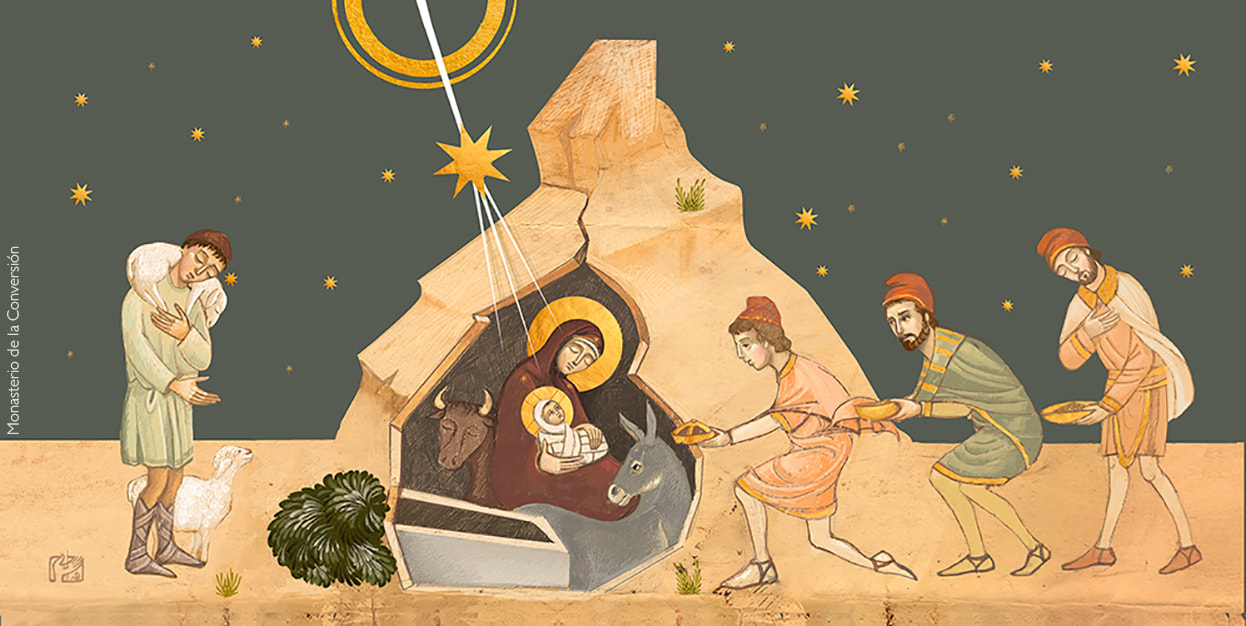
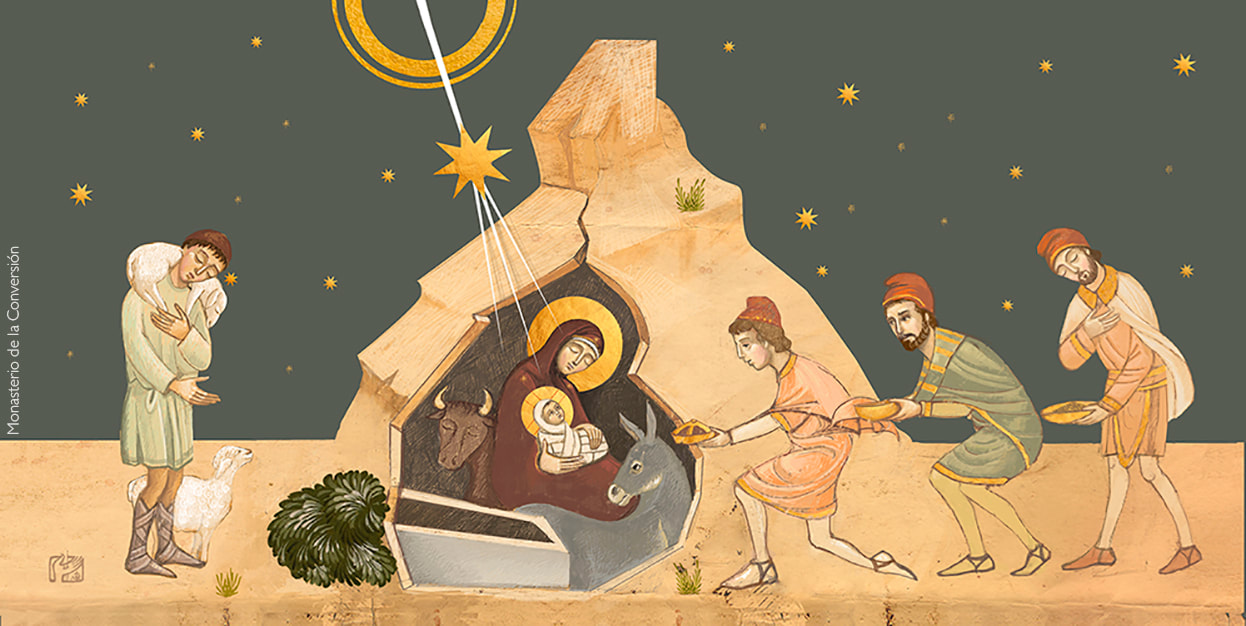
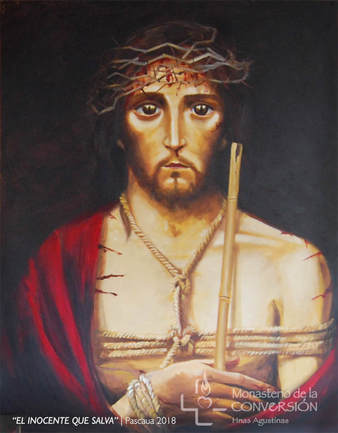
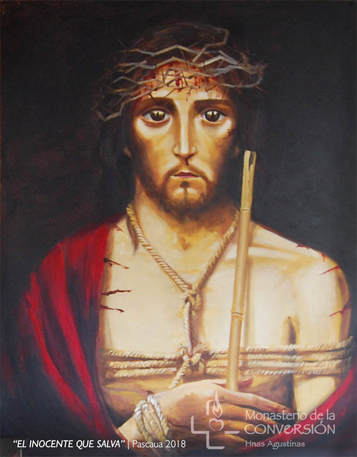
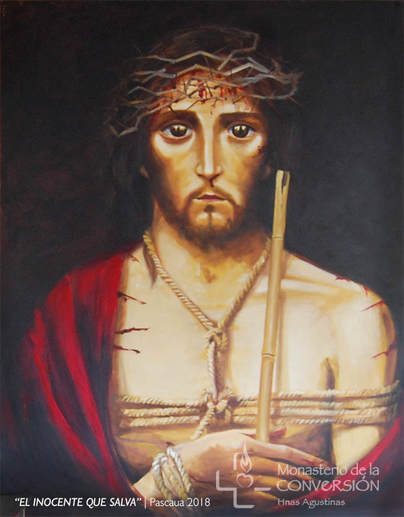
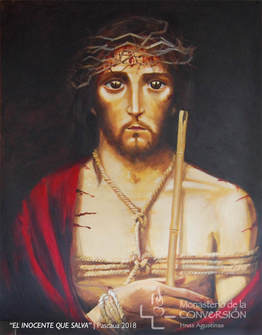
 Fuente RSS
Fuente RSS
